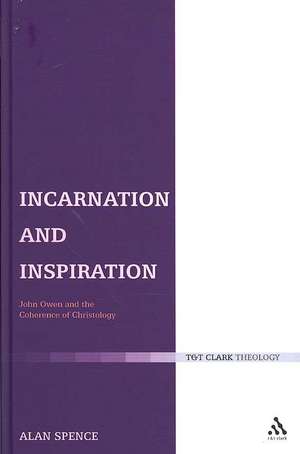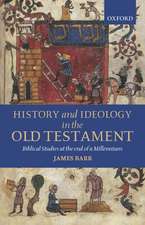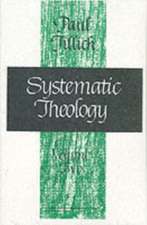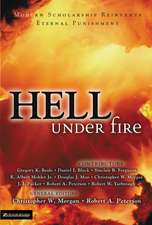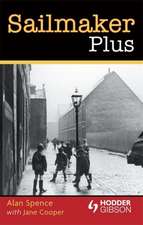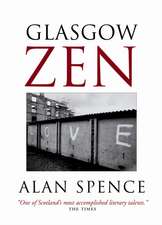Incarnation and Inspiration: John Owen and the Coherence of Christology
Autor Rev Dr Alan J. Spenceen Limba Engleză Hardback – 14 apr 2007
Preț: 947.69 lei
Preț vechi: 1101.96 lei
-14% Nou
Puncte Express: 1422
Preț estimativ în valută:
181.34€ • 189.84$ • 150.05£
181.34€ • 189.84$ • 150.05£
Carte tipărită la comandă
Livrare economică 05-19 aprilie
Preluare comenzi: 021 569.72.76
Specificații
ISBN-13: 9780567045379
ISBN-10: 0567045374
Pagini: 182
Dimensiuni: 156 x 234 x 20 mm
Greutate: 0.44 kg
Editura: Bloomsbury Publishing
Colecția T&T Clark
Locul publicării:London, United Kingdom
ISBN-10: 0567045374
Pagini: 182
Dimensiuni: 156 x 234 x 20 mm
Greutate: 0.44 kg
Editura: Bloomsbury Publishing
Colecția T&T Clark
Locul publicării:London, United Kingdom
Caracteristici
In the last twenty years a minor industry of doctoral disserations, articles and books has developed around the theology of John Owen, particularly in the US.
Cuprins
Preface Part I- Two Ways Of Thinking About Christ Inspiration or Incarnation1. Why did Jesus pray? 2. Incarnational Christology 3. Inspirational Christology 4. Compatibility and the witness of the tradition a. Spirit Christology b. Basil of Caesarea c. Adoptionism d. Irenaeus e. The Antiochenes f. The Alexandrians g. Chalcedon 5. John Owen Part II- Incarnation The Son assumes human nature1. The writing of Christologia 2. Christ as the way of our knowing 3. The context in which Christ is known 4. The wisdom of God and the person of Christ5. The appropriateness of the incarnation 6. The pre-existent Son 7. God's eternal counsels 8. The agent of the incarnation 9. The Word became flesh 10. The assumption of human nature 11. Anhypostasia 12. The hypostatic union 13. The natures distinguished 14. Interaction between the natures Part III- Inspiration The Spirit renews God's image in Christ's human nature1. Quakers and Socinians. 2. The Spirit in the Christian life 3. The Spirit in Nature and in Grace 4. Christ as the foundation and goal of the Spirit's work 5. Firstborn among many brothers 6. The Spirit's work in Jesus 7. Inspiration and incarnation 8. Master-stories 9. Integrity of the Person Part IV -The Mediator One person acting in two natures1. Athanasius - The Incarnation of the Word of God 2. Anselm - Why was God made Man? 3. Calvin - Incorporating both perspectives 4. The office of Mediator 5. The person of the Mediator a. a human nature b. a divine nature 6. From Logos to Mediator 7. The Mediator as subject of the incarnate life 8. Evaluation Part V- The Son And The Father Of the same being 1. Introduction of the homoousion 2. Arian christology 3. The Athanasian alternative a. The new difficulties it introduced b. The Son as servant c. The Son as divine 4. The Socinians a. Challenge to the Trinity b. Son by adoption c. Dependent on the Father 5. Owen's response a. The eternal Son b. The Son as Mediator 6. Conclusion Part VI -The Son And The Children An 'autokinetic' human nature1. The relation between the natures 2. The Apollinarian solution 3. An alternative account 4. The nature of Christ's humanity a. Jesus as our prototype b. Jesus as willing priest c. Jesus as God's revelation 5. The self-consciousness of Jesus 6. Conclusion Part VII -Trinitarian Agency The Son and Spirit as distinct agents 1. Our knowledge of God as triune 2. The essence of the doctrine 3. Opera Trinitatis ad extra sunt indivisa 4. Distinct principles of operation a. The Spirit as a distinct person b. The Son assumes human nature 5. Resolution 6. Consistent? 7. Strictures on the tradition 8. New possibilities Part VIII- Conclusion 1. The problem of christology 2. Owen and the coherence of Chalcedon 3. Coherence and modern christology BIBLIOGRAPHY
Recenzii
This constitutes a useful, although controversial, contribution to Christology in general and to the thought of John Owen in particular, and is written in an accessible and readable style that will commend it to a wide range of readers, specialist and general.
"Spence's book would serve as an ideal textbook...an able and patient tour guide, he shows readers the sites of Christology, helpfully giving us the back story to and unpacking the internal logic of pressing Christological dillemas." Journal of Reformed Theology, 2008.
"Spence's book would serve as an ideal textbook...an able and patient tour guide, he shows readers the sites of Christology, helpfully giving us the back story to and unpacking the internal logic of pressing Christological dillemas." Journal of Reformed Theology, 2008.
